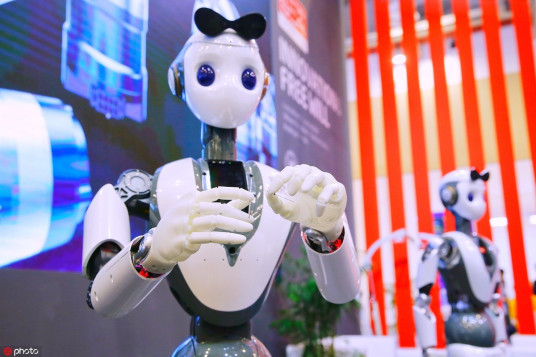Too early to pick artificial intelligence winner
 |
|
A smart robot passes the thread through the eye of a needle during the Global AI Product Application Expo 2019 (AI Expo 2019) in Suzhou city, East China's Jiangsu province, May 9, 2019. [Photo/IC] |
China, US both have strengths, experts say, making it difficult to choose who will emerge
The US and China are in a race to become the most dominant in artificial intelligence (AI). Experts say that both economic superpowers have strengths and weaknesses that make it difficult to predict which one will come out on top.
"Whereas China overtook the US in AI funding in 2017 and H1 2018, this sector received five times more money in the US in the period from 2012-2016," Georg Stieler, managing director of STM China, a German consulting firm with an office in Shanghai, told China Daily
In 2017, China pledged that the country would become a global leader in AI by 2030, investing billions of dollars in research and attracting and retaining the brightest talent.
As it moves toward its first goal in 2020, research by AT Kearney said that 39 percent of almost 450 senior executives of large corporations in 23 countries that it polled believe China will eventually overtake the US as the global leader in AI. But 35 percent think it's unlikely.
"The US certainly has the advantage of more experience in this field," Stieler said. "In 2017, it had still four times more AI researchers with 10 years' experience. Although China produces a large number of widely cited AI-related papers, US and UK research remains more influential.''
He said that while the US and China jostle for first place, China could come out on top: "One should not underestimate China's capabilities to make major advancements in fields it has declared a national priority."
Artificial intelligence is set to revolutionize several industries and create hundreds of thousands of jobs. It is crucial for facial recognition, mobile phones, digital assistants like Amazon's Alexa, cashierless retail, security surveillance and even detecting diseases in humans, such as atrial fibrillation, and in plants. It also will be used in teaching, security, photography and data labeling.
China is leading in facial recognition technology and is strong in speech recognition but is still lagging in autonomous cars in comparison to the world leader Google's Waymo, according to Stieler.
Another bright spot for China is that it published 90,000 research papers on AI over the past decade – making it No 1. But the US had the most highly cited papers compared with China — which had 45 percent of the global total in 2018 — according to the China Academy of Information and Communications Technology Newsletter.
The US has edged ahead as it has multiple investment streams for AI, in-depth research being carried out and a larger workforce than China, despite China attracting world-renowned researchers to its shores.
As of March 2019, the US also had the most active AI companies in the world, with 2,169. But China followed closely with 1,189, 10 of which were privately owned startups valued at $1 billion, including facial recognition firm SenseTime.
The desire to be first in AI comes as the total amount of global investment in the first quarter of 2019 was $12.6 billion, down 7.3 percent from the previous quarter.
The entire market is expected to grow by $75.54 billion from 2019 to 2023, according to a report by Technavio, a leading global technology research and advisory company.
And what will it mean for a country to be dominant in the field? Experts say it will "boost productivity and might also bring military superiority".
To deliver an AI service, such as facial recognition or language translation, one expert says you need both the neural networks (software) and the chips (hardware).
Many Chinese companies, such as like Alibaba and Baidu, currently deliver web services using their own software running on Intel chips. But as technology gets more specialized, so do the chips needed to power it.
Linley Gwennap, the principal analyst for The Linley Group, Inc, a US chip research firm, told China Daily: "For chips, US companies Nvidia, Intel and Google provide almost all of the chips used for AI in data centers. Huawei has recently begun shipping a data-center product but hasn't published performance benchmarks.
"The leading smartphone vendors — Samsung, Huawei, Apple — design their own AI chips; others use Qualcomm (US) or MediaTek (Taiwan) AI chips. Performance-wise, Qualcomm and Huawei are very close.
"Chinese companies such as HiSilicon and Horizon Robotics have been very active in developing AI chips for cameras (particularly for surveillance), although some US and other companies also participate in this market," Gwennap said.
There is a need for a new type of processor for AI, as it handles enormous amounts of data to carry out tasks. China has to import much of the hardware necessary for AI from the US, and that has the potential to slow the country down, especially amid a trade war, said Stieler.
"The large cloud-computing centers for the training of neural networks are running primarily on Nvidia chips," he said. "Even though there are now alternatives in the form of sophisticated chip designs from Chinese companies such as Huawei's HiSilicon, these firms are still dependent from US chip-design software from Cadence Design Systems or Snyopsis. Also, chip foundries in Chinese mainland are a couple of years behind when it comes to manufacturing technologies.
"The most sophisticated chips made by TSMC, Samsung and Intel are using 7 nm technology, whereas SMIC, the most sophisticated foundry in Chinese mainland, is able to master 14 Nm. For the production of these chips, you need photolithographic systems, where Dutch ASML is the leading supplier. Losing the access to these technology providers would be a huge setback."
At least 60 percent of US companies expect to be using AI or advanced automation by 2022, up from 24 percent today. At least 18 percent plan to start using AI or advanced automation within the next year, according to a survey by Genesys.

